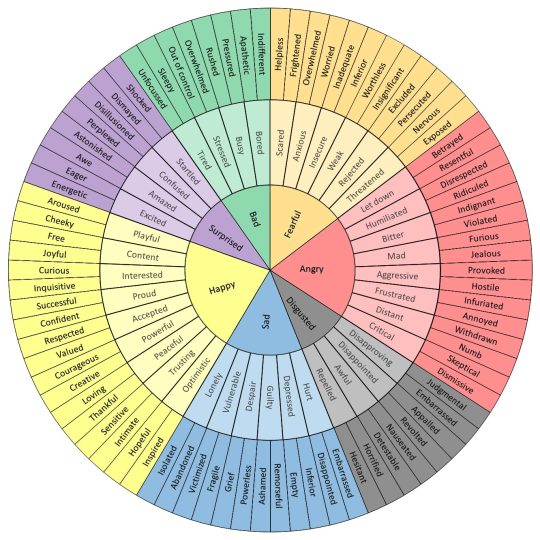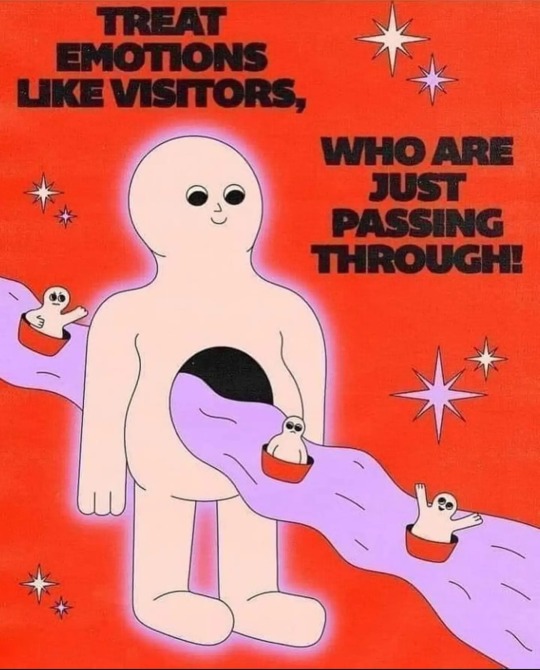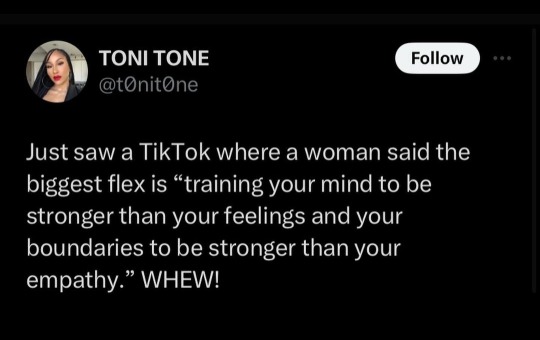#Emotional intelligence
Explore tagged Tumblr posts
Text
★ Discipline Made Beautiful

Discipline and consistency are often seen as heavy or restrictive, but they are the foundation of any goal. By reframing these practices as empowering and beautiful, they stop feeling like sacrifices and start feeling like acts of self-respect. The key to achieving your dreams is aligning your daily actions with the life you envision.
So, I have a list of actionable ways to embrace discipline and consistency in your life!

⋆ Reframe Discipline as Self-Care Instead of viewing discipline as deprivation, see it as an act of love toward yourself. Showing up for your goals—whether it’s working out, studying, or creating—fosters self-respect and builds confidence.
Example: Choosing to eat foods that nourish your body isn’t about restriction but about creating a body you feel confident and strong in. The same idea applied here.
⋆ Build a Lifestyle That Reflects Your Goals Align your habits and routines with the person you want to become. When you act in ways that reflect your goals, you start believing in the possibility of achieving them.
Example: Slow, intentional mornings with a cup of tea and a moment for gratitude can make success feel attainable and normalize a higher standard of living.
⋆ Normalize Small Wins Create small, intentional experiences that reflect the life you want. These moments help you feel successful and keep you motivated to stay consistent.
Example: Rewarding yourself with a favourite skincare product or a relaxing bath after sticking to your routine reinforces positive feelings about your journey.
⋆ Fall in Love with the Process Not every part of building the life you want will feel exciting, but you can find joy in knowing these actions contribute to something greater. Consistency becomes easier when you view it as part of your identity.
Example: Journaling may not feel thrilling every day, but it’s a ritual that connects you to your goals and fosters clarity.
⋆ Practice Gratitude for the Journey Appreciate how far you’ve come and recognize that every small step matters. Gratitude helps you shift your mindset from focusing on what’s lacking to seeing the beauty in the progress you’ve made.
Example: Look back on a previous version of yourself and celebrate the growth that discipline and consistency have brought into your life.

When you align your actions with the life you desire, success stops feeling distant and starts feeling inevitable.
Celebrate your progress and trust in the journey—you are building something beautiful.
Wishing you all the best,

#self discipline#discipline#emotional intelligence#it girl#it girl energy#growth#self growth#self improvement#self development#self love#becoming that girl#girlboss#girlblog#girlblogging#advice#self esteem#studyblr#tumblr girls#girlhood#womanhood
2K notes
·
View notes
Text
Green Flags in Communication 💚💬
"I want to know when I hurt your feelings."
This shows they are willing to understand and acknowledge the impact of their actions.
"I don't want you to feel alone in this."
This shows empathy and indicates that the person is supportive and does not want the person to deal with issues alone.
"I've been struggling with ___”
This demonstrates vulnerability and trust, as the person is open about their struggles.
"How have you been feeling about ___? I know it's been on your mind a lot."
This shows concern for the other person's issues or worries, showing that they are listening and care about what's important to the other person.
"I feel __ when you __; are you open to trying __ next time?"
This is an example of constructive communication.
"What do you need from me when this happens with your family?"
This shows awareness and sensitivity to the persons family dynamics and a willingness to provide support.
"I appreciate when you ___.”
Expressing appreciation is vital for positive reinforcement and acknowledging the efforts and qualities of the other person.
"I didn't handle that well."
This is a sign of self-awareness and accountability, recognizing one's own mistakes and being open to learning and growth.
"I'm sorry, I was wrong to say that. I'll try to be more mindful in the future."
Shows you are able to apologize genuinely and a commitment to improving behavior.
"Tell me more about that; I'm really interested in hearing your perspective."
Indicates a genuine interest in the other person's thoughts and feelings.
"I noticed you seemed a bit off today. Is everything okay?"
It shows you are attentive to the other person's emotional state and a readiness to provide support.
"I'm here for you, no matter what you need."
Offers unconditional support, creating a sense of security in the relationship.
"I love how passionate you are about your hobbies. It's inspiring to see."
Expresses admiration for the other person's interests.
"Let's work on a solution together. What do you think would be fair?"
Focusing on collaboration rather than conflict.
"I trust your judgment on this."
Trust and respect for the other person's decision-making abilities.
"Your happiness is important to me. Let's make sure you're taking time for yourself."
Prioritizes the other person's happiness and emphasizes the importance of self care.
"It's okay to feel that way. Do you want to talk about it more?"
Validates the other person's feelings.
"I appreciate how you handled that situation. You're really good at ___."
Praises specific strengths or skills, boosting the other person's self-esteem.
"I know we disagree, but I respect your point of view."
Acknowledges differences in opinion while still maintaining respect and understanding.
#communication#personal improvement#personal growth#personal development#self help#self awareness#self reflection#self improvement#healthy relationships#relationship advice#relationships#green flags#emotional intelligence#healthy relationship#health and wellness#mental wellness#mental health#level up journey#glow up tips#glow up#positive mindset#growth mindset
6K notes
·
View notes
Text
Common Sense for women in their 20s
Define your raison d'être
Journal regularly, in fact daily
Figure out the right hairstyle for you
Buy clothes that fit your body type
Learn to do you own makeup if you'd like to wear it
Observe, observe, observe
Try to participate in the society
Know that not everything is within your control
Do not live in fantasy or fear, they are distractions
Read books
Learn to form you own opinion
Do not force friendships
Do not stress the small stuff
Spend time getting to know your self
Know women's history & History and use it to your advantage
Have some intellectual rigor
Create your own community
Find a third space
Take your vitamins
Your wellbeing and wellness should be your priority
Have role models for every area of your life
Have discretion
Do not be quick to anger
Have mentors and be a mentor to others
Your social skills will take you far
Be responsible, the world is not so forgiving to women
Know when to stand out
Know when to fit in
Curate your life to fit your goals and desires
Understand strategy and how best to use it to your advantage
Get acquainted with what maks the world go round
You have to climb socially
You need allies in areas where you want to win
Be kind
Be content with what you have, otherwise you will pay the price
#self improvement#self love#growth#mindfulness#self development#education#beauty#self care#classy#self help#self control#self discipline#self worth#emotional intelligence#get motivated#mindset#reading#books and reading#booklr#new books#new year
4K notes
·
View notes
Text
if you want to experience life more deeply you have to find more beauty. stop training yourself to dismiss, to mock, to assume the worst all the time — when you do this you build walls between yourself and the world. and after a while you stop feeling the warmth of it entirely.
beauty requires openness. it asks you to let things reach you, to soften enough to be moved. it’s not naive to see beauty everywhere—it’s a skill, a form of intelligence, a kind of quiet bravery. because it is so much easier to critique than to create, to detach than to engage, to dismiss than to love.
let yourself be affected. let yourself find things beautiful and let that be enough. life is not asking you to be cool, sitting on the sidelines and nitpicking everything. it’s asking you to see life and experience it fully.
#it girl energy#becoming that girl#lucky girl syndrome#it girl#self improvement#self development#personal excellence#level up#self care#dream girl guide#emotional intelligence#soft skills#vanilla girl#beauty is an energy
525 notes
·
View notes
Text
Feelings Wheel

This is the feelings wheel by Geoffrey Roberts, shown to me by my therapist. My initial thought was, "what amazing synonyms to use for diverse emotional vocabulary!"
More than that, this wheel is great for understanding your characters inner motivations and reactions to situations. For example, if a character constantly feels helpless, then their overarching characteristics will be that they are fearful.
Characters who are less emotionally aware may use words and act in the inner most circle. Those much more aware of their emotions may describe themselves or express and use words from the outer most circle.
Hopefully you guys find this as helpful as I did! Let me know down in the comments.
Happy Writing!
#creative writing#character development#emotional growth#emotional intelligence#novel writing#story writing#tumblr writers#writing community#writer things#writing advice#writing tips#writing resources
9K notes
·
View notes
Text
a big fan of intelligence, both emotional and intellectual.
#girlblogger#girlblogging#this is what makes us girls#girlhood#poetry#coquette#etherealcore#gloomy coquette#im just a girl#random#girl thoughts#thoughts#it girl#manic pixie dream girl#girlcore#becoming that girl#girl interrupted#study motivation#studyblr#mental health#positive mental attitude#emotional intelligence#philosophy#gaslight gatekeep girlboss#girlblog aesthetic#hell is a teenage girl
256 notes
·
View notes
Text
how to protect urself and stop breaking ur own heart⋆.ೃ࿔*:・🍡

in this world its crucial to learn urself wholly so that u can protect urself in the best way possible. ofc u won't be able to protect urself from everything because some situations are opportunities to grow which is what life is all about. but lets talk about protecting urself and how to NOT break ur own heart…💬🎀


LEAVE THE PAST WHERE IT IS ;
first thing i wanna touch on is STOP checking on ppl that no longer have space in ur life. its just so stagnant and useless like why do u care? if u have enough time to check on someone from YEARSS ago (especially if this someone did u wrong) then ur wasting time that u won't get back. go spend ur time on something useful like affirming.
i feel like this also encompasses not trying to change people. respect a person for who they are -> not what u hope they will become. dont be friends or get into a relationship with someone for potential because they won't grow and evolve unless they WANT to. if ur thinking "oh just give them time, they have potential" or "they'll change, they won't keep hurting and disregarding my feelings" then ur just wasting ur time.
ALSO it doesnt matter if ur excuse is that you've known each other for a long time, ur allowed to leave relationships, situationships, friendships that no longer serve you its YOUR life. ur 100% allowed.
LEARN URSELF ;
by becoming aware of what u value, what triggers you, ur boundaries etc you can stay true to that and protect urself better. something that u can do to help you to learn yourself + how to protect urself is
make a list of things that u LIKE or are OKAY with. things that make u feel good. then make a list of things that make u feel bad and things that u don’t like…💬🎀
stay true to that list. when u understand urself and ur triggers u can protect urself better. live privately because what ppl don’t know they can’t ruin. not everyone has to know ur business, which leads me to my next point.


WHAT PEOPLE DONT KNOW, THEY CANT RUIN ;
dont put ur business out there for everyone ALL the time. privacy is power and the more private u are the less people will have to try and sabotage u because not everyone wants the best for you. when u tell everyone everything that makes you vulnerable and vulnerability can be good when building meaningful relationships and connections, you should NOT be vulnerable with every single person.
USE UR INTUITION ;
what u can't immediately sense YOUR BODY CAN. thats why we have things like gut feelings and hunches that often times are correct. ur intuition is like, everything that u know or have experienced subconsciously that u might not be able to recollect quickly, but ur body can. thats why its there.
#honeytonedhottie⭐️#it girl#becoming that girl#self concept#self care#that girl#self love#advice#it girl energy#dream girl tips#dream girl#dream life#self improvement#self reflection#self awareness#emotional intelligence#mindset#personal growth#hyper femininity#girly#girl blog#girl talk#girl thoughts#my thoughts💬🎀#intuitive#boundaries#self discovery
862 notes
·
View notes
Text

Treat Emotions Like Visitors Who Are Just Passing Through
#perspectives#perspective#emotional intelligence#motivation#motivational#wholesome#mindfulness#mindful#stoic#stoicism#daily life#living#psychology#happiness#pro tip#life tips#life lessons
2K notes
·
View notes
Text
Femme Fatale Guide: Tips To Become More Emotionally Intelligent
Embrace self-awareness & self-reflection: Observe how you feel, behave, and how people generally respond to your words/actions in different situations
Practice self-regulation: Learn to differentiate between your feelings and the actions that would be appropriate in a specific setting or interaction. Internalize that feelings are fleeting and non-factual. You're in control of how you respond/(don't) act on these emotions
Engage in active listening: Pay attention to what others are saying with the intent of understanding, not responding
Focus on emotional differentiation: Understand where your thoughts, feelings, intentions, and opinions end and another person's identity/perception begins
Display radical empathy and acceptance: Understand that almost all people's words and actions result from their own beliefs, past experiences, and current life circumstances/priorities. Put yourself in their shoes when attempting to understand their choices, behaviors, and times they come to you to discuss a problem, success, or major life decision. Accept that you can only control what you do. Very little of other people's actions/the world's workings are personal. Things are happening around you, not to you
Let go of your ego: View yourself as objectively as possible with the potential for improvement. Abolish any superior complex or overwhelming desire to prove your self-importance in others' lives and decisions
Remain open-minded: Question your own beliefs and opinions. Stay curious as to why you believe them to be true/authentic to you. Allow your opinions to change or have the capacity to modify your beliefs upon hearing new information. Understand your worldview and values are valid, but they're not definitively correct beliefs, just because they resonate/feel comfortable for you
Be receptive to feedback: Embrace constructive criticism as a self-improvement tool. Approach it with curiosity and optimism, not as a personal attack
Differentiate between your feelings and capabilities: Your thoughts are not facts. Remember you can do things you don't feel like doing most of the time (work, waking up in the morning, working out, etc.). Learn the difference between being a slave to your emotions and genuinely running out of energy
#emotional intelligence#emotional regulation#emotional maturity#inner work#social skills#socializing#networking#social interaction#emotional resilience#people skills#self improvement#successhabits#glow up tips#femme fatale#dark femininity#dark feminine energy#it girl#high value woman#the feminine urge#queen energy#female power#dream girl#female excellence#high value mindset#life tips#adulting#life advice#femmefatalevibe#communication skills#emotional wellness
1K notes
·
View notes
Text
★ Embrace Uncertainty for True Happiness

I recently started reading this amazing book about Emotional Intelligence and it totally opened my eyes to how important it is in our daily lives. Emotional Intelligence isn’t just about understanding our feelings—it’s also about being flexible and open to whatever life throws our way.
Just imagine this: You’ve set your heart on landing a specific job right after university. You imagine how perfect it will be working there, you already know how you'll organise your desk, and window shopping your future office outfits. But when things don’t go as planned i.e. you don't get the job, you feel crushed and start doubting yourself and feel you're not good enough or just plain unlucky in life. Personally I've been there TOO many times. This fixed mindset can blind you to other awesome opportunities that might be just as fulfilling.
However, I have some tips from the book on how to emotionally manage these kinds of situations!

▸ Step 1: Stay Open-Minded
Tell yourself, “I don’t know what the future holds, but I’m open to learning and growing from whatever comes my way.” Let go of those rigid expectations and embrace life’s unpredictability.
Why it matters: Staying open-minded helps you adapt to new situations and discover unexpected joys.
Real Talk: I once had a super fixed idea of becoming a neurosurgeon (brain doctor), but when I left highschool early, I thought I would be a failure forever. Then a Software Development apprenticeship opportunity popped up, I decided to give it a shot. It turned out to be one of the best decisions I ever made!
▸ Step 2: Focus on the Present
Make the most of your current experiences instead of always planning for some future “perfect” situation. Ask yourself, “What’s good about this moment right now?”
How to do it: Try practicing mindfulness through meditation or just take a few minutes each day to appreciate your surroundings.
Pro Tip: Start a gratitude journal. Every day, jot down three things you’re thankful for in the present moment. It’s a game-changer!
▸ Step 3: Embrace Growth in All Experiences
When challenges come your way, look for opportunities to learn or grow. Instead of labelling something as entirely good or bad, ask, “What can I take from this experience to make me stronger or wiser?”
Action step: After any setback, take a moment to reflect on what you’ve learned and how you can use it moving forward.
Personal Insight: During a tough breakup, instead of dwelling on the pain, I focused on what the relationship taught me about my needs and boundaries. This helped me grow and prepare for healthier relationships in the future.

Building emotional intelligence isn’t something you do overnight—it’s a continuous journey of self-discovery and adaptation.
So, as you navigate your own path, remember to embrace the uncertainty and trust that each experience, whether good or bad, is shaping you into a stronger, wiser version of yourself.
Here’s to your amazing journey ahead,

#emotional intelligence#it girl#it girl energy#growth#self growth#self improvement#self development#self love#becoming that girl#girlboss#girlblog#girlblogging#advice#book rec#self esteem#studyblr#tumblr girls#girlhood#womanhood
552 notes
·
View notes
Text
How to Stop Procrastinating by Managing Your Emotions
Procrastination happens when we delay doing things, and it's often connected to our emotions. Feelings like being afraid to fail, feeling worried or stressed, getting bored, or lacking motivation can all contribute to procrastination. To stop procrastinating and get more things done, it's important to learn how to handle our emotions better.
Boredom:
Break the task into smaller, more engaging sub-tasks.
Find ways to make the task more interesting or challenging.
Set a timer and work on the task for a specific amount of time, followed by a short break doing something enjoyable.
Feeling Overwhelmed:
Prioritize tasks and focus on one thing at a time.
Break the task into smaller, more manageable steps.
Delegate some parts of the task if possible or seek help from others.
Use tools like to-do lists or task management apps to stay organized.
Anxiety:
Practice deep breathing or mindfulness techniques to calm yourself.
Challenge negative thoughts and replace them with more positive and realistic ones.
Start with the easier or less intimidating aspects of the task to build momentum.
Set realistic expectations and remind yourself that it's okay to make mistakes.
Self-Doubt:
Focus on past accomplishments and successes to boost your confidence.
Seek support or feedback from others to gain reassurance.
Remind yourself of your skills and capabilities to tackle the task.
Use positive affirmations to counteract negative self-talk.
Perfectionism:
Embrace the concept of "good enough" rather than seeking perfection.
Set realistic and achievable goals for each task.
Recognize that mistakes and imperfections are part of the learning process and growth.
Indecisiveness:
Break decisions into smaller steps and make one small decision at a time.
Set a time limit for making decisions to avoid overthinking.
Trust your instincts and make the best decision you can with the information available.
Apathy or Lack of Interest:
Find aspects of the task that align with your values or long-term goals.
Break the task into smaller, more manageable parts and focus on completing one at a time.
Reward yourself for completing the task to make it more appealing.
Stress or Burnout:
Practice stress-reduction techniques such as meditation, exercise, or spending time in nature.
Break tasks into smaller steps to reduce the feeling of overwhelm.
Prioritize self-care and take breaks to avoid burnout.
Feeling Uninspired or Creatively Blocked:
Engage in activities that stimulate creativity, such as brainstorming, mind mapping, or seeking inspiration from others' work.
Start with a simple and basic version of the task to get the creative juices flowing.
Collaborate with others or seek feedback to gain new perspectives.
Fear of Success:
Identify and challenge the negative beliefs or fears that may be holding you back.
Visualize the positive outcomes of completing the task successfully.
Focus on the benefits and personal growth that come with success.
Impatience:
Break long-term goals into smaller milestones to track progress.
Practice mindfulness to stay present and patient throughout the process.
Remind yourself that progress takes time and effort.
Lack of Confidence:
Celebrate your past accomplishments to boost your confidence.
Seek support and encouragement from friends, family, or mentors.
Focus on building specific skills related to the task to increase confidence.
Avoiding Discomfort:
Acknowledge that discomfort is a natural part of growth and improvement.
Break tasks into smaller steps and tackle the more challenging aspects gradually.
Remind yourself of the long-term benefits of facing discomfort.
Overestimating Future Motivation:
Practice discipline and commit to starting tasks even when motivation is low.
Set specific deadlines for tasks to create a sense of urgency.
Establish a routine that includes regular work on the task to build consistency.
#discipline#motivationalquotes#motivateyourself#get motivated#organization#procrastination#emotional intelligence#self improvement#selfimprovement#self love#self development#personal improvement#personal growth#personal development#level up journey#success mindset#positive mindset#business mindset#goalsetting#life goals
9K notes
·
View notes
Text
Becoming an Intelligent Woman
My Dears,
There is no greater goal than being a fine woman who is intelligent, kind, and elegant. As much as we all want to be described with these adjectives, it takes a great amount of discipline to get there. It is very doable only if you are ready to put in the work.
Here are steps you can add to your routine in the next 4 weeks that will make you 1% more intelligent than you were before. This is a process that should become a habit not a goal. It is long term, however, I want you to devote just 4 weeks into doing these steps first and recognize the changes that follow.
Watch documentaries: This is the easiest step, we all have access to Youtube. Youtube has a great number of content on art, history, technology, food, science etc that will increase your knowledge and pique your curiosity. I really did not know much about world history especially from the perspective of World war 1 & 2, the roaring 20s, Age of Enlightenment, Jazz era, monarchies etc but with several channels dedicated to breaking down history into easily digestible forms. I have in the last 4 weeks immersed myself into these documentaries. Here are a few I watched:
The fall of monarchies
The Entire History of United Kingdom
The Eight Ages of Greece
World War 1
World War 2
The Roaring '20s
The Cuisine of the Enlightenment
2. Read Classics: I recommend starting with short classics so that you do not get easily discouraged. Try to make reading easy and interesting especially if you struggle with finishing a book. Why classics? You see, if you never went to an exclusive private school in Europe or America with well crafted syllabus that emphasized philosophy, history, art, and literary classics, you might want to know what is felt like and for me this was a strong reason. Asides that, there is so much wisdom and knowledge available in these books. In these books, you gain insights to the authors mind, the historical context of the era, the ingenuity of the author, the hidden messages, and the cultural impact of these books. Most importantly, you develop your personal philosophy from the stories and lessons you have accumulated from the lives of the characters in the books you read. Here are classics to get you started:
Animal Farm by George Orwell
Pride and Prejudice by Jane Austen
Jane Eyre by Charlotte Brontë
The Great Gatsby by F Scott Fitzgerald
Candide by Voltaire
Paradise lost by John Milton
3. Study the lives of people who inspire you: I dedicate one month to each person that fascinates me. I read their biography (date of birth, background, death, influences, work, style, education, personal life) For this month, I decided to study Frank Lloyd Wright because I was fascinated by the Guggenheim Museum in New York. I began to read about his influence in American Architecture (Organic architecture, Prairie School, Usonian style), his tumultuous personal life, his difficult relationship with his mentor (Louis Sullivan), his most iconic works etc. By the end of the year I would have learned the ins and outs of people I am inspired by through books and documentaries. Here are other people I plan to learn more about:
Winston Churchill
Jacqueline Kennedy Onassis
Ada Lovelace
Benjamin Franklin
Helen Keller
John Nash
Isabella Stewart Gardner
Caroline Herrera
Ernest Hemingway
Catherine the Great
Ann Lowe
My dears, I hope you enjoyed this read. I cannot wait to write more on my journey to becoming a fine woman. I urge you to do this for four weeks and see what changes you notice. Make sure to write as well, it is important to document your progress.
Cheers to a very prosperous 2024!
#fine woman#growth#self love#self development#mindfulness#education#classy#beauty#self help#self care#interiors#self discipline#self worth#emotional intelligence#intellectual#intelligent#interesting#booklover#bookworm#booklr#educateyourself#get motivated#self improvement
2K notes
·
View notes
Text
It's especially sad to me, how apparently common it is for some people to think autistic/neurodivergent people are lying or trying to manipulate them when they're actually being radically honest— it's just "too" honest for them to identify or accept.
It's sad that their honesty is considered "radical" relative to neurotypical society, when it would in nearly all cases be healthier and better for everyone to be more open and honest with each other.
#autism#actually autistic#autistic adult#autistic things#autistic trauma#communication trauma#communication#neurodivergent#neurodiversity#relationships#honesty#manipulation#lying#lies#dishonesty#misinterpretation#assumptions#mental health#mental wellness#neurotypical#society#emotional awareness#emotional maturity#emotional intelligence#authenticity#radical honesty#misunderstood#understanding#healthy relationships#cognitive distortions
206 notes
·
View notes

